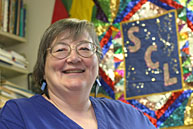Compiling Creole in the Caribbean
Compiling Creole in the Caribbean McGill University
User Tools (skip):
Compiling Creole in the Caribbean
Professor Lise Winer, Integrated Studies in Education, figures she's been working on a historical scholarly dictionary of the English and Creole of Trinidad and Tobago since 1980 when she was a PhD student of linguistics at the University of West Indies. Then, she was looking at the influence of vernacular Creole on school kids' writing. Now she's an expert on the different Trinidadian words for everything -- from marbles to cock fighting.
 Education Professor Lise Winer
Education Professor Lise WinerPhoto: Owen Egan |
|
"People don't take the Caribbean seriously," she says. "Even scholars feel free to downplay the Caribbean, in a way they would never denigrate a European society."
When she tells her friends she's heading down south to do fieldwork, they have romantic notions of her sitting in the sun on a beach sipping rum daiquiris, warm sand between the toes. "Well I'm allergic to alcohol and I hate the weather," Winer says. And her tromping through fields and enduring bug bites is done "all on a shoestring budget."
Winer stays with friends when in Trinidad, and believes in sharing her scholarship with the community that has welcomed her so generously. She gives public talks, is often interviewed by the local papers, and goes on radio shows.
Winer is currently president of the Society for Caribbean Linguistics, which promotes scholarship on the languages of the Caribbean Islands and coast (which includes Miami, thanks to its thriving Caribbean community).
Trinidadian is quite different from other Caribbean English, French and Dutch creoles. Although a Jamaican dictionary already exists, there's only a linguistic overlap of about twenty to thirty percent with Trinidad and Tobago. "You'd read books, and there'd be all these words and you wouldn't be able to look it up," she says. Winer's also editing a series of Trinidadian novels, written from 1838–1907, which are reprinted by the University of West Indies Press. Nineteenth century Trinidad literature draws on its extremely varied ethnocultural history, eschewing stereotypes found in other Caribbean writing of the time.
Trinidad was first colonized by the Spanish (who opened it up to Catholics from France and Haiti), then the English took over. Other linguistic influences include Bhojpuri, a language from Bihar, India, where many of the island's indentured labourers came from. Tobago's influences are also varied: mostly British, with evidence of the Dutch and Latvian colonization in the place names.
Although some Creole words are obsolete, such as historical terms having to do with the Spanish rule, most words have local currency. "It's important to not fall prey to the romanticization of the old. It's not like little museums," she says, shunning the relic-hunting of some researchers, instead preferring to show how the language has developed over the past 200 years within a political and social context.
Although Winer spends a lot of time with older people, it's a lexicographical myth that linguistic information can only be found with aged rural folk. The use of language in Trinidad and Tobago does not run on a neat continuum of old to new, but is mixed up like a marble cake or confetti.
Winer asks people to use a word in a sentence to clarify its meaning. "You have to cover everything, not just names for tools or the colour of a rooster," she said. There are abstract terms in kinship and religion, words to describe feelings or concepts, and she's seeking them all.
So what does a scholar need to create a dictionary? "Sitzfleisch," she says -- the patience and persistence to sit on one's behind for hours doing tedious research.
It also helps to have a strong interest in natural history since Trinidad has more flora and fauna than any other Caribbean country. (There are 500 different birds alone, from caciques to cornbirds.) But "you have to be a generalist," she adds. For instance, there are a lot of old words for marbles because boys used to play the game (the big shooter is called a "taw" or "tor," a term that goes back centuries). And the language of cooking is heady with local ingredients and predilections (the tasty browned rice stew at the bottom of a pot has its own name, "bun bun"). In short, her work runs the gamut of "fish, food, forest, frogs and flying things," she laughs.

